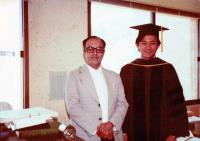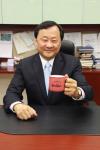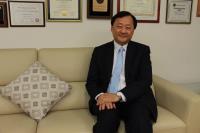"Appreciation and Gratitude" - Budding Thoughts
Professor Wah's "appreciative and thankful" thoughts derived from Professor C. V. Ramamoorthy, the advisor for his doctoral thesis. "I've enjoyed the privilege of being enlightened by my mentor, not only in doing academic research, but also in my way of life and the way I work." Prof. Wah's mentor is an Indian reaching 89 years old in the current year. Since they met in 1975, the deep-seated mentor/mentee bonding has never faded away.
Prof. Wah reminisced about his mentor's demeanour: the mentor always carried a bright smile on his face; always showed appreciation for students' work regardless of significance in achievement, which greatly encouraged his students. "To show appreciation for people does not cost anything, but the person who receives the appreciation will enjoy the benefits it brings. When I felt I was being encouraged, I would feel like empowered, and I would like to do even better." This experience has led him to understand how important it is for "appreciation and gratitude" to act as a drive for motivation.
To this day, Prof. Wah is still especially thankful that his mentor introduced him to different people in the academic circle, which helped him get started in the academic world; more importantly, during his studies he was taught by example the way to deal with people and matters in the community in future. That is why by the time Prof. Wah completed his PhD studies, he was aware that he had also grown into a "new man".
"Appreciation and Gratitude" – A Working Culture
Inspired by his mentor, Prof. Wah entered the workplace bringing with him "appreciation and gratitude". "Gratitude is a positive reinforcement through which you will get to know how well you have done your job." Prof. Wah believed that we should learn to appreciate people in their work, and that we should not grudge in expressing our gratitude. When colleagues gain recognition, they will naturally put in more thoughts and efforts into their work, and achieve even more.
On top of personal performance, a culture of appreciation and gratitude can also encourage team members to make good use of their strengths and support each other, enhancing positiveness in teamwork. "Taking note of how they are being nurtured by the institution they serve at, they will come to ask themselves what they can do to make a difference." Through figuring out how to interact with the working team, people can position their role within the team and make positive contribution.
So how to go about creating a "working environment endorsed by appreciation and gratitude"? Prof. Wah believes it is particularly important to keep an open mind. As people have different views and opinions, a thankful atmosphere does the job of encouraging people to say what is on their mind. A diversity of views will always bring benefits to the development of an institution. When studying in the States, Prof. Wah was able to appreciate deeply the benefits an open culture could bring. He recalled there were lots of opportunities for open discussion in overseas colleges where students would participate and speak their mind; they were able to communicate freely with college heads and even the president during meetings, which would eventually help in the growth of individuals and institutions.
What to do when facing "pressure"?
More often than not, work pressure will damage staff morale resulting in negative emotions and thereby affecting the building up of a thankful atmosphere in the workplace. Prof. Wah believed that in modern days the pressure that people felt at work, to a certain extent, was attributable to excessive demands. We must understand that there are people out there in the community that are superior to us, just as there are others who are inferior to us. The most important thing is to learn how to be contented. "Today, as long as I can accomplish my work within my ability, there are no regrets; then I should feel thankful: Well done! I'm contented."
Prof. Wah looked back at himself when he was working as a "small wage earner" at the university, but then the standard of living was not necessarily worse than it is now. Nevertheless, people nowadays set "own a car and own a property " as their goals, adding immense pressure on themselves. He believed that we should not get anxious for success. "Most of the time, we need to work hard, need to wait; we shouldn't be thinking about getting what we want one day away. In this way we will not have imposed such great pressure on ourselves." What is more important is the mentality: relax, with eyes wide open, be a visionary.
In addition to self-imposed pressure, getting along with colleagues can put pressure on us too, such as when different views exist among colleagues or that there is a communication issue. Prof. Wah pointed out when there were different voices in the workplace, the best solution would be putting ourselves in the perspective of the other party, to enable us to understand their standpoint. A go-between could be arranged to help coordinate communication when necessary.
He reminded us when facing difficulties, we should not make any impulsive decisions; we should calm down and think of a good solution. Sometimes leisure activities will help us de-stress. For Prof. Wah, he loves to go country hiking whenever time permits. Besides enjoying the changing scenery along the way, it will also give him time for reflection on decisions and practice made in everyday life. The most important thing is to embrace positive thoughts, because "very often when we think from the perspective of the worst scenario, the worst will happen in the end."
To practise "Appreciation and Gratitude" in our life
When asked who should become our target of appreciation, Prof. Wah explained that we should be thankful to every person we encountered. "When someone did well or offered you a favor, you should always express gratitude to this person."
While on campus, every time he saw sincere smiling faces on students at the graduation ceremony, or when his opinions were accepted and adopted by his colleagues in faculty meetings, Prof. Wah would feel a sense of contentment and gratitude.
Having taken up several key positions in the university, Prof. Wah follows a hectic work schedule and is therefore very grateful to his wife and twin daughters for their understanding. "My greatest regret is not having enough time to chat with my two daughters and to go on family outings together. Very often the responsibility of taking care of them was shouldered by my wife. I am thankful that today my two daughters have grown up to become independent persons and performed outstandingly in their work." Under the influence of their father, the two sisters have chosen to go down the "Computer Science" road. They expressed gratitude to their father not only for inspiring them to embark on the road of scientific research, but also for his role model so that when obstacles were encountered in their research, such as when an academic paper was not selected for publication, they were able to remain positive and optimistic.
Life motto
"Appreciation and gratitude" is not only applicable to work as a positive outlook can bring changes to life. As far as Prof. Wah is concerned, "Committed to the right things and always perform to the best of my ability." is his motto. Life is short, do what we can, persevere on the right track, then life should have no regrets.













